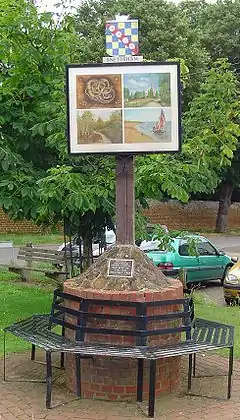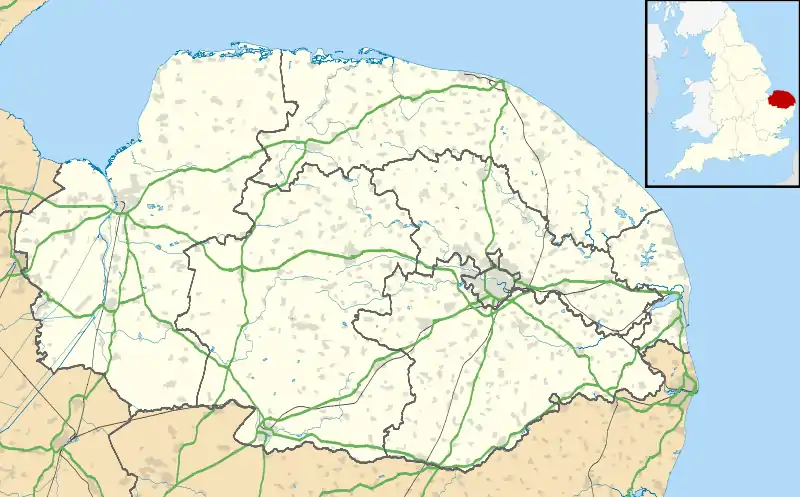Snettisham
Snettisham is a village and civil parish in the English county of Norfolk. It is located near the west coast of Norfolk, some 5 miles (8.0 km) south of the seaside resort of Hunstanton, 9 miles (14 km) north of the town of King's Lynn and 45 miles (72 km) northwest of the city of Norwich.[1]
| Snettisham | |
|---|---|
 Bench and signpost in Snettisham | |
 Snettisham Location within Norfolk | |
| Area | 28.03 km2 (10.82 sq mi) |
| Population | 2,570 (2011) |
| • Density | 92/km2 (240/sq mi) |
| OS grid reference | TF685340 |
| Civil parish |
|
| District | |
| Shire county | |
| Region | |
| Country | England |
| Sovereign state | United Kingdom |
| Post town | KING'S LYNN |
| Postcode district | PE31 |
| Police | Norfolk |
| Fire | Norfolk |
| Ambulance | East of England |
| UK Parliament | |


The civil parish has an area of 28.03 km2 (10.82 sq mi) and in the 2001 census had a population of 2374 in 1097 households. For the purposes of local government, the parish falls within the district of King's Lynn and West Norfolk.[2] The Civil Parish population had increased to 2,570 at the 2011 Census.[3]
Snettisham RSPB reserve, on the coast of The Wash some 2 miles (3.2 km) to the west of Snettisham village, is a nature reserve in the care of the Royal Society for the Protection of Birds. It consists of bird lagoons and bird observation hides, including a rotary hide.
The Snettisham coast around the reserve is often said to be "where Norfolk stares at Lincolnshire". This is because, unlike much of Norfolk's coast where the sea stretches to the horizon, Snettisham looks across the square-mouthed estuary of The Wash at the county of Lincolnshire, only 15 miles (24 km) away. The River Ingol runs to the south of the village upon which stands the now unused Snettisham watermill. This is now in the process of being renovated (October 2011).
Though traces of the railway station and railway line can still be seen the service which was opened in 1862 was terminated in 1969.
St Mary's Church in the village has a 14th-century, 172-foot (52 m) high spire. Nikolaus Pevsner called it "perhaps the most exciting decorated church in Norfolk". It served as the model for the later Christ Church Cathedral in Fredericton, New Brunswick, Canada, built 1845-1853.
The Snettisham Hoard is a series of discoveries of Iron Age precious metal, including nearly 180 gold torcs, 75 complete and the rest fragmentary, found in the area between 1948 and 1973. In 1985 there was also a find of Romano-British jewellery and raw materials buried in a clay pot in AD 155, the Snettisham Jeweller's Hoard. Although this latter find has no direct connection with the nearby Iron Age finds, it may be evidence of a long tradition of gold- and silver-working in the area.[4][5]
Snettisham has a complex entry in the Domesday Book of 1086, where it is divided in ownership between William de Warenne and the Bishop of Bayeux. Related berewicks are West Newton and Castle Rising, moreover Weston Longville is said to be in Snettisham's valuation. The name of the manor is spelt in four different ways, two very similar to the present pronunciation, one of Snesham and one of Nestesham.[6]
Governance
An electoral ward in the same name exists. This ward had a population of 4,032 at the 2011 Census.[7]
See also
Notes
- Ordnance Survey (2002). OS Explorer Map 250 - Norfolk Coast West. ISBN 0-319-21886-4.
- Office for National Statistics & Norfolk County Council (2001). Census population and household counts for unparished urban areas and all parishes Archived 2017-02-11 at the Wayback Machine. Retrieved December 2, 2005.
- "Civil Parish population 2011". Retrieved 29 August 2015.
- "The Snettisham Treasure". Current Archaeology. Archived from the original on 9 May 2006. Retrieved 6 June 2006.
- "Jeweller's hoard from Snettisham". The British Museum. Archived from the original on 13 April 2010. Retrieved 9 June 2010.
- Domesday Book: A Complete Translation. London: Penguin, 2003. ISBN 0-14-143994-7 p.1075-6 and 1090
- "Ward population 2011". Retrieved 29 August 2015.
External links
| Wikimedia Commons has media related to Snettisham. |
- Information from Genuki Norfolk on Snettisham.
- Current events link to Lynn News